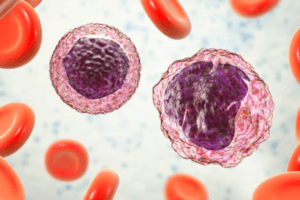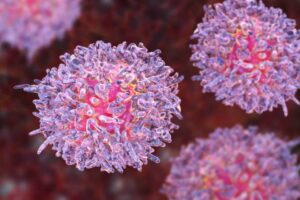Cancer immunotherapy is at the leading edge of personalized medicine. Immunotherapy for patients with cancer involves the use of immune cells, often the patient’s own cells, to develop a treatment to target tumor cells. The two most widely studied cancer immunotherapies have been tumor-infiltrating lymphocyte (or TIL) therapies and chimeric antigen receptor (CAR) T-cell therapies. Despite the promising outcomes for some patients treated with these approaches, some forms of cancer, such as pancreatic cancer, seem resistant.
Pancreatic ductal adenocarcinoma is one of the most challenging cancers to treat and has a high mortality rate. A collaboration of scientists from Earle A. Chiles Research Institute of the Providence Cancer Institute and the National Cancer Institute previously identified T-cell receptors that target KRAS G12D, a “hot spot” signaling protein mutation found in certain cancers.[1] Clinical researchers in this collaboration developed autologous TILs to treat a colorectal cancer patient which led to regression of metastases.
The finding that pancreatic cancers also have KRAS mutations led the research group to explore whether T-cell receptor gene therapy that targets mutant KRAS proteins (neoantigens), could provide a positive therapeutic response for patients with pancreatic cancer as well.[2]
A clinical trial was conducted in a single patient with pancreatic cancer that had metastasized to the lungs. Peripheral blood mononuclear cells (PBMCs) were collected from the patient as the first step in creating the immunotherapy. To engineer T cells targeting mutant KRAS protein, T-cell receptors were isolated from the previously treated patient with colorectal cancer, synthesized, and cloned for use to transduce the PBMCs. T cells were isolated from the transduced PBMCs, expanded in culture, and harvested for patient administration.
The patient received one infusion of the genetically engineered autologous T cells (85% CD8+ T cells and 15% CD4+ T cells). Over 90% of the cells expressed the mutant KRAS neoantigen–specific T-cell receptors. Although the patient experienced short-lived toxic events associated with the preconditioning therapy that was provided days before the T-cell infusion, no adverse effects were seen with the engineered T cells.

A month after the T-cell infusion, computed tomography scans showed regression of metastatic lung lesions, and the partial response (a reduction in the size of a tumor by 50% or more) was determined to be 62%. Tumor regression was still noted by the 6-month follow up with an overall partial response of 72%.
Treatment of a second patient with engineered T-cells, but with a modification in the preconditioning protocol, had a less favorable outcome. The exact reason for this is unknown, but the approach remains promising.
The research data obtained in these one-patient clinical trials warrant additional studies with more participants to determine the efficacy and safety of neoantigen T-cell receptor gene therapy for pancreatic and other mutant KRAS–expressing cancers. The approach could also be adapted to engineer cells targeting other tumor specific neoantigens that may be more important in a given cancer.
Want to Learn More?
To learn more on this topic, check out our recent articles on emerging cell & gene therapies and cancer research. You can also subscribe to our blog by entering your email below for industry updates, technical articles and scientific case studies.





